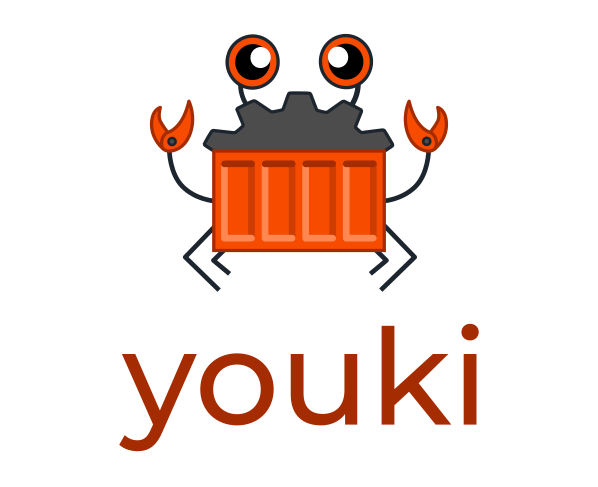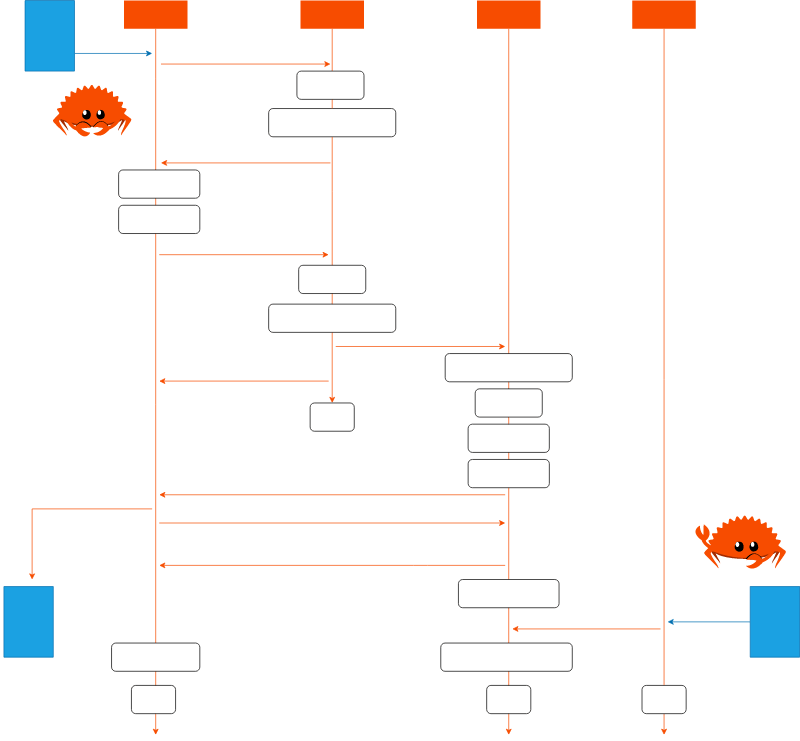14 unstable releases (5 breaking)
| 0.5.3 | Mar 21, 2025 |
|---|---|
| 0.5.1 | Jan 16, 2025 |
| 0.4.1 | Sep 4, 2024 |
| 0.3.3 | May 21, 2024 |
| 0.0.4 | Dec 13, 2022 |
#73 in Unix APIs
32 downloads per month
1MB
24K
SLoC
youki: A container runtime in Rust

youki is an implementation of the OCI runtime-spec in Rust, similar to runc.
Your ideas are welcome here.
🏷️ About the name
youki is pronounced as /joʊki/ or yoh-key. youki is named after the Japanese word 'youki', which means 'a container'. In Japanese language, youki also means 'cheerful', 'merry', or 'hilarious'.
🚀 Quick Start
[!TIP] You can immediately set up your environment with youki on GitHub Codespaces and try it out.
$ just build $ docker run --runtime youki hello-world $ sudo podman run --cgroup-manager=cgroupfs --runtime /workspaces/youki/youki hello-world
🎯 Motivation
Here is why we are writing a new container runtime in Rust.
-
Rust is one of the best languages to implement the oci-runtime spec. Many very nice container tools are currently written in Go. However, the container runtime requires the use of system calls, which requires a bit of special handling when implemented in Go. This tricky (e.g. namespaces(7), fork(2)); with Rust too, but it's not that tricky. And, unlike in C, Rust provides the benefit of memory safety. While Rust is not yet a major player in the container field, it has the potential to contribute a lot: something this project attempts to exemplify.
-
youki has the potential to be faster and use less memory than runc, and therefore work in environments with tight memory usage requirements. Here is a simple benchmark of a container from creation to deletion.
Runtime Time (mean ± σ) Range (min … max) vs youki(mean) Version youki 111.5 ms ± 11.6 ms 84.0 ms ± 142.5 ms 100% 0.3.3 runc 224.6 ms ± 12.0 ms 190.5 ms ± 255.4 ms 200% 1.1.7 crun 47.3 ms ± 2.8 ms 42.4 ms ± 56.2 ms 42% 1.15 Details about the benchmark
-
A command used for the benchmark
hyperfine --prepare 'sudo sync; echo 3 | sudo tee /proc/sys/vm/drop_caches' --warmup 10 --min-runs 100 'sudo ./youki create -b tutorial a && sudo ./youki start a && sudo ./youki delete -f a' -
Environment
$ ./youki info Version 0.3.3 Commit 4f3c8307 Kernel-Release 6.5.0-35-generic Kernel-Version #35~22.04.1-Ubuntu SMP PREEMPT_DYNAMIC Tue May 7 09:00:52 UTC 2 Architecture x86_64 Operating System Ubuntu 22.04.4 LTS Cores 16 Total Memory 63870 Cgroup setup unified Cgroup mounts Namespaces enabled mount enabled uts enabled ipc enabled user enabled pid enabled network enabled cgroup enabled Capabilities CAP_BPF available CAP_PERFMON available CAP_CHECKPOINT_RESTORE available
-
-
I have fun implementing this. In fact, this may be the most important.
📍 Status of youki
youki has aced real-world use cases, including containerd's e2e test, and is now adopted by several production environments. We have our roadmap.

🔗 Related project
- containers/oci-spec-rs - OCI Runtime and Image Spec in Rust
🎨 Design and implementation of youki
The User and Developer Documentation for youki is hosted at https://youki-dev.github.io/youki/
🎬 Getting Started
Local build is only supported on Linux. For other platforms, please use the Vagrantfile that we have prepared. You can also spin up a fully preconfigured development environment in the cloud with GitHub Codespaces.
Requires
- Rust(See here), edition 2021
- linux kernel ≥ 5.3
Dependencies
To install just, follow the instruction here.
Debian, Ubuntu and related distributions
$ sudo apt-get install \
pkg-config \
libsystemd-dev \
build-essential \
libelf-dev \
libseccomp-dev \
libclang-dev \
libssl-dev
Fedora, CentOS, RHEL and related distributions
$ sudo dnf install \
pkg-config \
systemd-devel \
elfutils-libelf-devel \
libseccomp-devel \
clang-devel \
openssl-devel
Build
git clone git@github.com:containers/youki.git
cd youki
just youki-dev # or youki-release
./youki -h # you can get information about youki command
Tutorial
Requires
- Docker(See here)
Create and run a container
Let's try to run a container that executes sleep 30 with youki. This tutorial may need root permission.
git clone git@github.com:containers/youki.git
cd youki
just youki-dev # or youki-release
mkdir -p tutorial/rootfs
cd tutorial
# use docker to export busybox into the rootfs directory
docker export $(docker create busybox) | tar -C rootfs -xvf -
Then, we need to prepare a configuration file. This file contains metadata and specs for a container, such as the process to run, environment variables to inject, sandboxing features to use, etc.
../youki spec # will generate a spec file named config.json
We can edit the config.json to add customized behaviors for container. Here, we modify the process field to run sleep 30.
"process": {
...
"args": [
"sleep", "30"
],
...
}
Then we can explore the lifecycle of a container:
cd .. # go back to the repository root
sudo ./youki create -b tutorial tutorial_container # create a container with name `tutorial_container`
sudo ./youki state tutorial_container # you can see the state the container is `created`
sudo ./youki start tutorial_container # start the container
sudo ./youki list # will show the list of containers, the container is `running`
sudo ./youki delete tutorial_container # delete the container
Change the command to be executed in config.json and try something other than sleep 30.
Rootless container
youki provides the ability to run containers as non-root user(rootless mode). To run a container in rootless mode, we need to add some extra options in config.json, other steps are same with above:
$ mkdir -p tutorial/rootfs
$ cd tutorial
# use docker to export busybox into the rootfs directory
$ docker export $(docker create busybox) | tar -C rootfs -xvf -
$ ../youki spec --rootless # will generate a spec file named config.json with rootless mode
## Modify the `args` field as you like
$ ../youki run rootless-container # will create and run a container with rootless mode
Usage
Start the docker daemon.
dockerd --experimental --add-runtime="youki=$(pwd)/youki"
If you get an error like the below, that means your normal Docker daemon is running, and it needs to be stopped. Do that with your init system (i.e., with systemd, run systemctl stop docker, as root if necessary).
failed to start daemon: pid file found, ensure docker is not running or delete /var/run/docker.pid
Now repeat the command, which should start the docker daemon.
You can use youki in a different terminal to start the container.
docker run -it --rm --runtime youki busybox
Afterwards, you can close the docker daemon process in other the other terminal. To restart normal docker daemon (if you had stopped it before), run:
systemctl start docker # might need root permission
Integration Tests
Go and node-tap are required to run integration tests. See the opencontainers/runtime-tools README for details.
git submodule update --init --recursive
just test-oci
Setting up Vagrant
You can try youki on platforms other than Linux by using the Vagrantfile we have prepared. We have prepared two environments for vagrant, namely rootless mode and rootful mode
git clone git@github.com:containers/youki.git
cd youki
# If you want to develop in rootless mode, and this is the default mode
vagrant up
vagrant ssh
# or if you want to develop in rootful mode
VAGRANT_VAGRANTFILE=Vagrantfile.root vagrant up
VAGRANT_VAGRANTFILE=Vagrantfile.root vagrant ssh
# in virtual machine
cd youki
just youki-dev # or youki-release
👥 Community and Contributing
Please refer to our community page.
Thanks to all the people who already contributed!

Dependencies
~24–44MB
~709K SLoC
